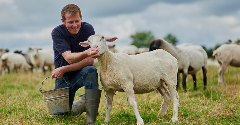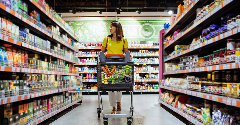News
Frugal food shoppers economise and make trade-offs to tackle inflation, says Deloitte
15 Mar 2023
Rising prices are making consumers around the world increasingly frugal, with some only buying essentials and others purchasing lower-cost meat and ingredients to manage spiraling food inflation, according to a new report by Deloitte.
As global food prices continue to spike, little has changed according to accounting firm Deloitte as consumers surveyed earlier this year in January are still as frugal as in late 2022.
The report ranks 23 countries using Deloitte’s Food Frugality Index (FFI) capturing “longitudinal change across six cost-saving behaviours,” said the authors. These behaviours were found to have a particularly strong connection to consumer frugality.

Many consumers have adopted the ’economise’ approach”, making efforts to reduce their food waste and shopping based on food already at home, only buying essentials, or buying less than wanted. One in five surveyed as part of Deloitte’s Global State of the Consumer Tracker in January left the grocery store in a period of two weeks buying less than they wanted to. Others are making ‘trade-offs’, a strategy used to keep the trolley full and supermarket costs down, by purchasing mainly store own brands or lower-cost meat cuts and ingredients.
From food frugality to food insecurity
“This behaviour goes beyond mere food frugality and could hint at the presence of food insecurity. The figure sits relatively high across a number of developed economies, including France (24%), Italy (21%), Germany (20%), the United States (18%), and the United Kingdom (19%)”.
Food frugality is particularly high in the UK. Each country has a different FFI likely to be driven by local economic conditions such as inflation trends.
“While overall inflation has decreased since October in the United Kingdom, food inflation hasn’t followed suit – it rose by 16.8% in December 2022, marking the biggest annual jump in food prices in the country since 1977,” said Deloitte.
In the US, year-over-year inflation rates for food eaten at home increased more than 10-fold over the last 18 months ending December 2022. Australia’s inflation rates are still rising and its FFI values “suggest consumers are increasingly on the defensive”, said Deloitte
Rising inflation, shrinking food
Amidst rising inflation, Dutch consumer rights group Foodwatch has asked consumers to flag brands and food manufacturers for “devious” shrinkflation practices. With rising ingredients costs and shortages, consumer products are reducing in weight, size, or quantity but prices are staying the same or even increasing.
 © AdobeStock/Chaay_tee
© AdobeStock/Chaay_tee
“This lack of transparency is unacceptable. As a consumer, you are deliberately being misled about the changed content and price of many solid food products that you are used to buying. Especially in times of high inflation, this practice can be called outrageous,” said Foodwatch.
Consumers are noticing shrinkflation in top categories including snacks, breakfast cereals, tea, biscuits, and soft drinks, according to data collected by Foodwatch.
Food frugality is exceptionally high among lower-income households
Frugality varies by income, however those with less money are increasingly frugal. In the US, from September 2022 leading into Christmas, “easing frugality among lower-earning Americans helped drive down the overall US score”, said Deloitte.
Signs of frugality can also be observed in middle-income consumers and, whilst higher earners are less likely to follow all six cost-saving behaviours, they show unique patterns such as buying more own label products as opposed to name brands.
“[Supermarkets] should understand how these frugality behaviours are playing out in their own stores and pass on that data to their [consumer packaged goods] CPG suppliers. Understanding the extent of price push-back and where it’s happening could help in decision-making and pricing contract negotiations. When possible, brands should share their price advocacy efforts with customers.”
Related news

California companies required to disclose heavy metal content in baby food
10 Jan 2025
As of January 2025, baby food manufacturers selling in California must disclose test results for four heavy metals – arsenic, lead, cadmium, and mercury – via an on-pack QR code.
Read more
Snack trends, ingredient claims, and plant-based perceptions: Highlights from Fi Europe 2023, part 1
7 Dec 2023
Value-led snacking, sustainability storytelling, and the importance of having a ‘star ingredient’: we asked consumer analysts and market experts at Fi Europe about the trends and innovations that are shaping the food industry.
Read more
Confirmed: California bans four ‘toxic’ food additives
10 Oct 2023
Four food additives, including the colouring Red No. 3, will be banned in food in the US state of California over safety concerns, with public health campaigners hoping this will spark a nationwide ban in the coming years.
Read more
Advocacy groups condemn EU Commission for backpedalling on animal rights
3 Oct 2023
Amid rumours that the EU may abandon its plans to improve animal welfare in farming and end the use of cages, many stakeholders have condemned this possibility and urged the EU to reconsider.
Read more
Poland and Ukraine attempt to resolve grain dispute
29 Sep 2023
Poland and Ukraine have begun talks to try to resolve a dispute regarding the ban on Kyiv’s grain imports that prompted Kyiv to file a lawsuit to the World Trade Organization.
Read more
The EU may be set to scrap its sustainability commitments
27 Sep 2023
A speech delivered by President Ursula von der Leyen last week inferred that the EU could be drawing back on its commitments to create a more sustainable and healthier food system.
Read more
Industry first: Mosa Meat becomes first cultivated meat startup to gain B Corp certification
11 Sep 2023
A first for the industry, Dutch cultivated meat company Mosa Meat announced that it has received B Corp certification and will soon apply for regulatory approval across the globe.
Read more
German supermarket trials climate-centric pricing model
29 Aug 2023
German discount supermarket Penny has trialled increasing product prices to mirror their health and environmental costs.
Read more
EPR fee delay spurs concerns over UK’s sustainability commitment
8 Aug 2023
The UK government’s decision to push back the introduction of fees for the Extended Producer Responsibility (EPR) due to inflation has raised doubts about whether this sustainability commitment will ever be realised.
Read more
Latino-owned food startups tackle climate change
25 Jul 2023
A growing list of Latino-founded food and beverage startups in the US are putting sustainability at the forefront of their businesses for the sake of the planet.
Read more